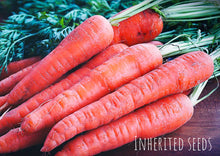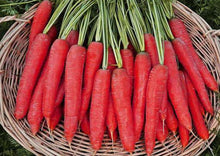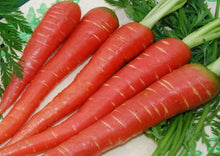Heirloom Organically Grown Sweet Red Carrots are a unique and rare variety of carrot that is prized for its sweet, rich flavor and high yield. The Sweet Red Carrot is considered an heirloom variety because it is open-pollinated, meaning it is not genetically modified or hybridized. Additionally, these seeds are certified organic, which means they are grown without the use of synthetic pesticides or fertilizers, ensuring a high-quality, safe and healthy crop.
The origin of the Sweet Red Carrot is believed to have originated in Europe, where it was traditionally grown by farmers for its unique color and taste. It is also known as "Red Cored Chantenay" carrot, where it was developed in the early 19th century. It has been gaining popularity in recent years among home gardeners and farmers alike for its sweet taste and high yield.
This heirloom variety is perfect for those looking to add a touch of color and flavor to their gardens and farms. These carrots are great for juicing or eating fresh and are a great addition to any meal. They are known for their high sugar content and their color can range from light to dark red.
Growing
Carrots grown in garden are full of flavor and texture. They are easy to grow as long as they are planted in loose, sandy soil during the cooler periods of the growing season—spring and fall (carrots can tolerate frost). Depending on the variety and local growing conditions, carrots may take anywhere from 2 to 4 months to mature. Plant them in the spring and summer for a continuous harvest through fall!
Planting
- Proper soil preparation is extremely important for carrot growing. If the carrot roots can’t easily grow unobstructed, it can lead to stunted and misshapen crops. Till down 12 inches and make sure there are no rocks, stones, or even soil clumps that could impede your carrots’ growth.
- Sow seeds outdoors 3 to 5 weeks before the last spring frost date. For continuous harvest, sow seeds every 2 weeks through late spring. For a fall harvest, sow seeds in mid- to late summer—starting about 10 weeks before your first fall frost.
- Sow seeds directly in the garden rather than transplanting. Carrots do not like to have their roots disturbed.
- Keep the soil moist with frequent shallow watering. For small carrot seeds to germinate, the soil shouldn’t form a hard crust on top; cover with a layer of vermiculite or fine compost to prevent a crust from forming.
- Avoid amending the soil with nitrogen-rich fertilizer, which causes carrots to fork and grow little roots.
- If the ground has clay, consider planting in a raised bed at least 12 inches deep and filled with airy, loamy soil.
- Choose a location that receives full sunlight. Carrot plants can tolerate partial shade too.
- Soil must be loose, sandy or loamy, and airy so that carrot roots can easily push down through the soil.
Care
- When seedlings are an inch tall, thin so that they stand 3 to 4 inches apart. Snip tops with scissors instead of pulling them out to prevent damage to the fragile roots of the remaining plants.
- Gently mulch carrots to retain moisture, speed germination, and block the sun from hitting the roots directly.
- Water at least one inch (about ½ gallon per square foot) per week to start, then two inches as roots mature.
- Weed diligently, but be careful not to disturb the young carrots’ roots while doing so.
Pests / Diseases
- Pests: Black canker, Carrot rust flies, Flea Beetles, Root-knot nematodes, Wireworms
- Aster Yellow Disease will cause shortened and discolored carrot tops and hairy roots. This disease is spread by pests as they feed from plant to plant. Keep weeds down and invest in a control plan for pests such as leafhoppers. This disease has the ability to overwinter.
Click here to download our free vegetable growing guide
Heirloom; Organically Grown; Sweet Red; Carrot Seeds; Non-GMO; Open-pollinated; Pesticide-free; Fertilizer-free; Unique variety; Sweet taste; Rich flavor; Europe origin; High yield; Home gardeners; Farmers; High sugar content; Red Cored Chantenay; Light to dark red; Indian vegetable seeds; Best indian vegetable seeds in USA; Top vegetable seeds for USA climate; Organic vegetable seeds India; High yield vegetable seeds India; Popular vegetable seeds in India, Heirloom Indian vegetable seeds USA; Vegetable seeds for home gardening USA; Traditional Indian vegetable seeds; Non-GMO vegetable seeds USA; Vegetable seeds for balcony gardening India; High-quality indian vegetable seeds USA; Vegetable seeds for urban farming USA; Seed companies in India; Best vegetable seeds for Indian kitchen garden; Fast-growing vegetable seeds India; Vegetable seeds for all seasons India; Best vegetable seeds for hydroponic gardening India; Vegetable seeds for beginner gardeners India and USA; Rare vegetable seeds India; Affordable vegetable seeds India; Imported vegetable seeds India; Native Indian vegetable seeds; Open-pollinated vegetable seeds India.






